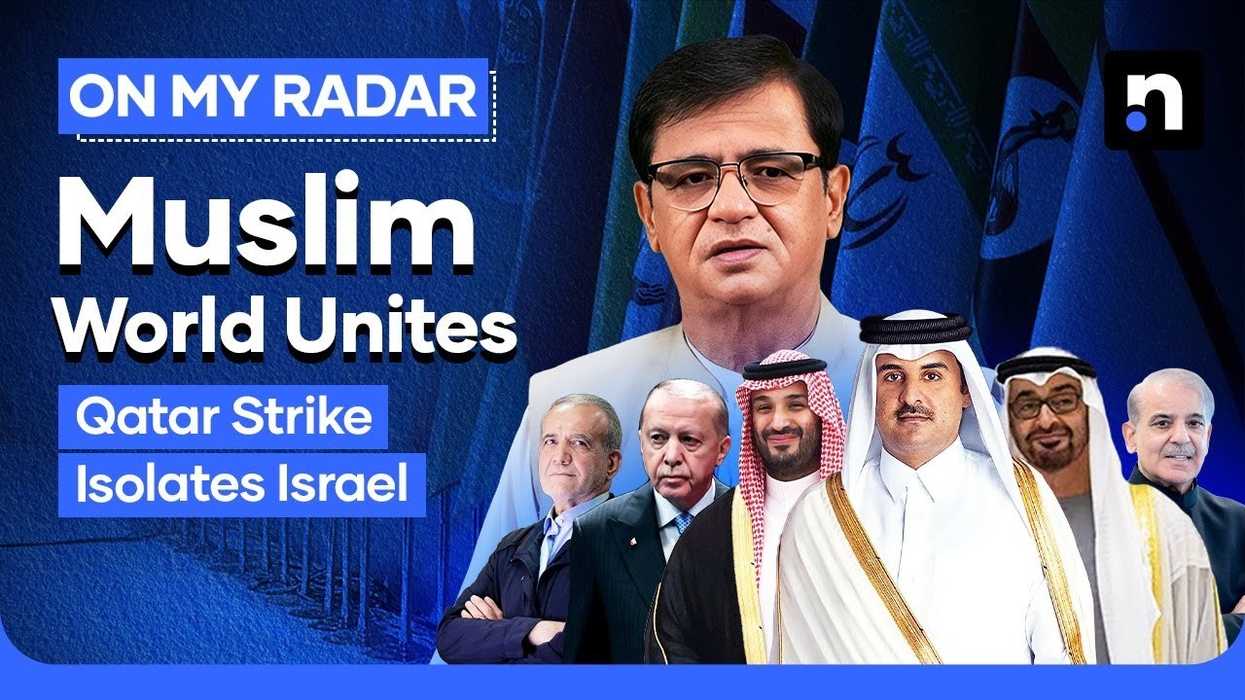Israel’s attack on Qatar sparks rare unity across Muslim world
Kamran Khan says Saudi and UAE leaders are leading a united Muslim front as Doha hosts an emergency summit
News Desk
The News Desk provides timely and factual coverage of national and international events, with an emphasis on accuracy and clarity.
Israel’s strike on Qatar has ignited anger and rare unity across the Muslim world, with leaders of Arab and Islamic nations rallying behind Doha ahead of an emergency summit this weekend.
The response is drawing parallels to the historic 1974 Organization of Islamic Conference in Lahore, where Muslim leaders stood on a single platform in an unprecedented show of solidarity. Once again, Kamran Khan said in his vlog, the vision of collective unity appears to be taking shape.
Saudi Crown Prince Mohammed bin Salman and United Arab Emirates President Sheikh Mohammed bin Zayed Al Nahyan have emerged at the forefront of the effort. A two-day Arab-Islamic summit will begin Sunday in Doha, with leaders set to discuss regional security, Qatar’s sovereignty, and what they describe as Israel’s violation of international law.
In an extraordinary address to Saudi Arabia’s Shura Council, Crown Prince Mohammed bin Salman declared unconditional support for Qatar, vowing that Riyadh would back any response Doha chose to take. “The Israeli attack requires a strong, joint reaction from the Islamic world, the Arab states, and the international community,” he said.
Leaders from across the region have already traveled to Qatar in a visible show of support. They include Sheikh Mohammed bin Zayed, Kuwait’s Crown Prince Khalid al-Sabah, Jordan’s Crown Prince Hussein bin Abdullah, Egypt’s Foreign Minister Badr Ahmed Mohamed, and Pakistan’s Prime Minister Shehbaz Sharif.
The UAE president’s unannounced visit to Doha was particularly symbolic, Kamran Khan noted, signaling that Qatar is not alone. Abu Dhabi not only condemned the Israeli strike but also rejected threats by Prime Minister Benjamin Netanyahu, who warned Qatar to expel Hamas leaders or face further action.
Diplomatically, Sheikh Mohammed bin Zayed has moved to align Gulf Cooperation Council members into a unified stance. Reports suggest his shuttle diplomacy prompted Bahrain, Oman, and other Gulf leaders to make urgent visits to Doha, reinforcing the message that an attack on one state would be treated as an attack on all.
Muslim leaders are positioning the Doha summit as more than a symbolic gathering. Many see it as the renewal of a collective pledge, echoing the 1974 OIC conference where figures such as Pakistan’s Zulfikar Ali Bhutto, Saudi King Faisal, Yasser Arafat, Anwar Sadat, and Muammar Gaddafi prayed together in Lahore. That moment, Kamran Khan said, had sent shockwaves through rival blocs.
The current moment, he added, may reflect a similar rare alignment after decades of division among Arab monarchies and Muslim nations.
Internationally, the UN Security Council convened at Pakistan’s request, with backing from Britain and France. Almost all members except the United States condemned the Israeli strike. Washington’s envoy, Dorothy Shea, said President Donald Trump had assured Qatari leaders that no such incident would occur again.
Still, the attack was widely viewed as a violation of international law. Qatar was mediating between Hamas and Israel on U.S. advice when the strike occurred. Reports confirmed that CIA Director John Ratcliffe and Mossad chief David Barnea had both visited Doha for talks in recent months. The assault, Kamran Khan argued, not only undermined Qatar’s sovereignty but also damaged prospects for future mediation.
Prime Minister Netanyahu’s subsequent warning that Israel would target its enemies anywhere deepened regional fears. In Arab capitals, debate has intensified over whether Israel’s next strike could target Egypt, Saudi Arabia, or even Turkey.
Turkish President Recep Tayyip Erdogan denounced the assault as “state terrorism,” while Iranian President Masoud Pezeshkian pledged solidarity with Qatar, calling Israel a “cancer” to regional and global peace.
Kamran Khan reflected that while the United States appeared to be testing Middle Eastern reactions through Israel’s aggression, the Muslim world faces both hope and risk.
Hope lies in the possibility of a unified stand at the Doha summit. The risk, he warned, is that if this moment of solidarity slips away, Israel may feel emboldened to launch further strikes with impunity.








Comments
See what people are discussing